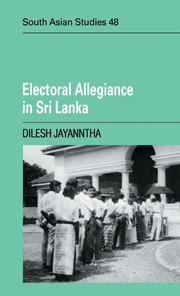Book contents
- Frontmatter
- Contents
- Acknowledgments
- List of abbreviations
- 1 Introduction
- 2 Bluville: the constituency and the patronage network of Doctor Ay (1947–1959)
- 3 Bluville: the patronage network of Korale-Mudaliyar Kit Foo and his son, Dee (1947–1959)
- 4 Bluville: the growth of the State (1956–1982)
- 5 Greenville: the patronage networks of the Mou/Nous and the Pou/Kous (1947–1959)
- 6 Greenville: the growth of the State (1956–1982)
- 7 Red Town: the urban setting (1947–1959)
- 8 Red Town: the growth of the State (1956–1982)
- 9 Communal minorities, political dissidents and the JVP
- 10 Conclusion
- Glossary of Sinhalese Terms
- References
- Index
- CAMBRIDGE SOUTH ASIAN STUDIES
- Frontmatter
- Contents
- Acknowledgments
- List of abbreviations
- 1 Introduction
- 2 Bluville: the constituency and the patronage network of Doctor Ay (1947–1959)
- 3 Bluville: the patronage network of Korale-Mudaliyar Kit Foo and his son, Dee (1947–1959)
- 4 Bluville: the growth of the State (1956–1982)
- 5 Greenville: the patronage networks of the Mou/Nous and the Pou/Kous (1947–1959)
- 6 Greenville: the growth of the State (1956–1982)
- 7 Red Town: the urban setting (1947–1959)
- 8 Red Town: the growth of the State (1956–1982)
- 9 Communal minorities, political dissidents and the JVP
- 10 Conclusion
- Glossary of Sinhalese Terms
- References
- Index
- CAMBRIDGE SOUTH ASIAN STUDIES
Summary
In this study we have examined the economic and social bases of political allegiance in low-country Sinhalese Sri Lanka. We have done this by focussing on three representative electorates in the Sinhalese Low Country, and on the families there which produced the candidates for election to Parliament from 1947 onwards. These families, from more than one caste, came from a given social stratum. They were almost always large landowners, with holdings spanning two or more districts. Their families intermarried with those of equivalent status, often from other districts, and sometimes from other provinces as well. They were often major philanthropists, and had also held Mudaliyarships in the British Provincial Administration.
The landholdings, wealth and administrative offices they monopolized enabled them to emerge as the major dispensers of local patronage. Such patronage took several forms: employment and fringe benefits offered to workers on estates; the construction of infrastructural facilities such as schools, hospitals and temples; private acts of charity and help extended especially to village elites and, most important, the protection offered to the latter and the opportunities given them to amass wealth and influence.
This patronage was dispensed primarily to local influentials and village notables. This was largely determined by structural factors. The schools, hospitals, roads and bridges constructed by the Doctor's family in Bluville benefited the richer villagers first. They were the ones best placed to afford the books, sandals and clothes needed to send their children to school. They were the ones who were most amenable to using Western medical facilities.
- Type
- Chapter
- Information
- Electoral Allegiance in Sri Lanka , pp. 199 - 206Publisher: Cambridge University PressPrint publication year: 1992



